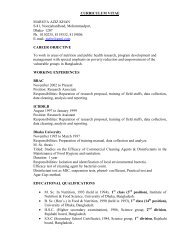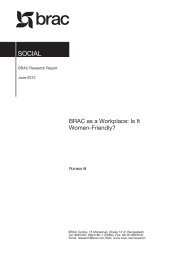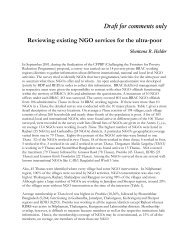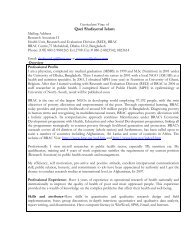Combining health and social protection measures to reach the ultra ...
Combining health and social protection measures to reach the ultra ...
Combining health and social protection measures to reach the ultra ...
You also want an ePaper? Increase the reach of your titles
YUMPU automatically turns print PDFs into web optimized ePapers that Google loves.
Access <strong>to</strong> <strong>health</strong><br />
reasonable in about half (48%) of <strong>the</strong> cases <strong>the</strong>y say, while<br />
in primary care only 13% of people treated received care that<br />
was adequate. Unmet needs were greater for <strong>the</strong> poor: older<br />
people, minority ethnic groups, those with low incomes or<br />
without insurance, <strong>and</strong> residents of rural areas 28 . The study<br />
concluded that “most people with mental disorders in <strong>the</strong><br />
United States remain ei<strong>the</strong>r untreated or poorly treated”. 28<br />
It is wrong <strong>to</strong> think that <strong>health</strong> services are usually <strong>the</strong> first<br />
port of call when people want help for mental illness. In <strong>the</strong><br />
national survey referred <strong>to</strong> above, a quarter of people who<br />
sought help first went <strong>to</strong> a member of <strong>the</strong> clergy. This pattern<br />
seems <strong>to</strong> be remarkably stable: <strong>and</strong> applied <strong>to</strong> 31% in <strong>the</strong><br />
1950s <strong>and</strong> <strong>to</strong> 24% in <strong>the</strong> 1990s. Indeed more people first<br />
went <strong>to</strong> a faith leader for help than went <strong>to</strong> a psychiatrist<br />
(17%), or <strong>to</strong> a general medical practitioner (17%) 29 .<br />
On what basis do people judge where <strong>to</strong> go for help? A<br />
large national survey in Germany described vignettes of<br />
people with depression or schizophrenia <strong>and</strong> asked about<br />
how <strong>to</strong> find help. Revealingly <strong>the</strong> general public thought that<br />
mental <strong>health</strong> staff are useful for treating people with<br />
schizophrenia, but not for depression. The reason for this is<br />
that most people felt that schizophrenia was caused by<br />
biological or uncontrollable influences, while <strong>the</strong>y unders<strong>to</strong>od<br />
depression <strong>to</strong> be a consequence of “<strong>social</strong> disintegration”<br />
(including unemployment, drug or alcohol misuse, marital<br />
discord, family distress or <strong>social</strong> isolation) so that people with<br />
depression were more often recommended <strong>to</strong> seek help <strong>and</strong><br />
<strong>social</strong> support from a friend or confidant 30 .<br />
This may go some way <strong>to</strong> explain why depression is<br />
essentially untreated in some countries. An international<br />
study of depression found that 0% of people with depression<br />
in St Petersburg received evidence-based treatment in<br />
primary care, <strong>and</strong> only 3% were referred on <strong>to</strong> specialist<br />
mental <strong>health</strong> care 31 . But <strong>the</strong> major barrier <strong>to</strong> care in that<br />
Russian site was money: an inability <strong>to</strong> afford treatment costs<br />
was <strong>the</strong> main barrier <strong>to</strong> care for 75% of <strong>the</strong> depressed<br />
Russian patients studied.<br />
Even under better resourced conditions, it is known that<br />
most people with a mental illness in <strong>the</strong> USA do not seek<br />
assistance. An early national survey found that fewer than<br />
one third of all mentally ill people received assessment <strong>and</strong><br />
treatment, although <strong>the</strong> rate rose <strong>to</strong> 60% for people with a<br />
diagnosis of schizophrenia 28,32,33 . It is a paradox that even<br />
though two thirds of all adults with a mental illness went<br />
untreated, a half of those who did receive treatment did not<br />
have a clear-cut mental illness 34 . Interestingly, <strong>the</strong> idea that<br />
conditions which are less stigmatized (for example,<br />
depression compared with schizophrenia) are those which<br />
are seen <strong>to</strong> be more treatable is not supported by <strong>the</strong> findings<br />
of <strong>the</strong>se surveys 35 . So no single fac<strong>to</strong>r is enough <strong>to</strong> explain<br />
complex patterns of help-seeking. Never<strong>the</strong>less, <strong>the</strong> weight of<br />
evidence does suggest that even when <strong>the</strong>re are no major<br />
financial barriers <strong>to</strong> care, that many people do not seek help<br />
or minimize <strong>the</strong>ir contact with services in an attempt <strong>to</strong> avoid<br />
being labelled as mentally ill 36 .<br />
Particular groups may have even lower rates of treatment<br />
for mental disorders, <strong>and</strong> this applies in particular <strong>to</strong> African<br />
Americans in <strong>the</strong> USA or <strong>to</strong> Black Caribbean groups<br />
in <strong>the</strong> UK 37 . Several American studies suggest that African<br />
Americans receive mental <strong>health</strong> care about half as often as<br />
white people 38-40 , even though <strong>the</strong>y have higher rates of some<br />
mental disorders 41,42 . Several important barriers <strong>to</strong> care can<br />
increase <strong>the</strong> impact of mental illnesses among black<br />
communities in Britain <strong>and</strong> <strong>the</strong> USA. These fac<strong>to</strong>rs have been<br />
described as: socio-cultural (<strong>health</strong> beliefs <strong>and</strong> mistrust of<br />
services), systemic (lack of culturally competent practices in<br />
mental <strong>health</strong> services) 43 , economic (lack of <strong>health</strong> insurance)<br />
or individual barriers (denial of mental <strong>health</strong> problems) 44 .<br />
The interplay of <strong>the</strong>se fac<strong>to</strong>rs produces <strong>the</strong> contradic<strong>to</strong>ry<br />
situation in which black groups may have higher rates of<br />
many mental illnesses, lower rates of general referral <strong>and</strong><br />
treatment, but higher rates of compulsory treatment <strong>and</strong><br />
forensic service contact 45;46 . In <strong>the</strong> USA patterns of contact<br />
with mental <strong>health</strong> services are in some ways different for<br />
black <strong>and</strong> white people. Black people with a mental illness<br />
are more likely <strong>to</strong> seek help if <strong>the</strong>ir families are supportive,<br />
<strong>and</strong> if a family member has had a positive personal<br />
experience of mental <strong>health</strong> care. In one study <strong>the</strong>y did not<br />
view mental <strong>health</strong> on a continuum of well-being, but tended<br />
<strong>to</strong> think of <strong>the</strong>mselves as ei<strong>the</strong>r mentally <strong>health</strong>y or mentally<br />
ill. Many interviewees said <strong>the</strong>y did not think <strong>the</strong>y were<br />
“crazy”, <strong>the</strong>refore <strong>the</strong>y did not seek mental-<strong>health</strong> services 47 .<br />
Also <strong>the</strong>re was little information about mental-<strong>health</strong> services<br />
in <strong>the</strong> African-American community. Most people interviewed<br />
did not learn about available mental-<strong>health</strong> services until <strong>the</strong>ir<br />
conditions had become severe 42 . There is an important<br />
general point here that we shall return <strong>to</strong> repeatedly in this<br />
book: that most people of all cultures have relatively little<br />
accurate <strong>and</strong> useful knowledge about mental illness.<br />
Such feelings, at best of ambivalence, <strong>and</strong> at worst of<br />
deliberate avoidance of treatment <strong>and</strong> care for fear of stigma,<br />
have been found throughout <strong>the</strong> world. For instance, a study<br />
of Muslim Arab female university students in Jordan, <strong>the</strong><br />
United Arab Emirates <strong>and</strong> Israel, for example, found that for<br />
most of <strong>the</strong>se women <strong>the</strong>ir first resort was <strong>to</strong> turn <strong>to</strong> God<br />
through prayer during times of psychological distress, ra<strong>the</strong>r<br />
than <strong>to</strong> seek help from <strong>health</strong> or <strong>social</strong> care agencies 48 . A<br />
strong reluctance <strong>to</strong> be seen as mentally ill appears <strong>to</strong> be a<br />
universal phenomenon.<br />
Even in battle-hardened soldiers stigma is a powerful<br />
fac<strong>to</strong>r. Over 3000 military staff from US Army or Marine<br />
Corps units were anonymously surveyed three <strong>to</strong> four months<br />
after <strong>the</strong>ir return from combat duty in Iraq or Afghanistan.<br />
They were assessed for depression, anxiety or post-traumatic<br />
stress disorder (PTSD). Most of <strong>the</strong> unwell soldiers (60–77%)<br />
did not seek mental <strong>health</strong> care, largely related <strong>to</strong> concerns<br />
about possible stigmatization 49 .<br />
Why do so many people try so hard <strong>to</strong> avoid contacting<br />
psychiatric services? People who are starting <strong>to</strong> have<br />
symp<strong>to</strong>ms of mental illness are also members of <strong>the</strong> general<br />
population <strong>and</strong> share <strong>the</strong> same pool of information about<br />
psychiatric disorders. The following common beliefs are<br />
likely <strong>to</strong> reduce <strong>the</strong>ir likelihood of seeking help: that<br />
psychiatric treatments are ineffective 50 ; that o<strong>the</strong>rs would<br />
react with avoidance; or that a person should solve <strong>the</strong>ir<br />
own problems 51 . At <strong>the</strong> same time, strong family<br />
Global Forum Update on Research for Health Volume 4 ✜ 063

















